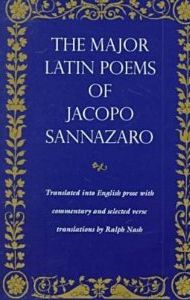This work contains prose translation of the poems of Neo-Latin poet Jacopo Sannazaro (1458-1530), whose work provides insights into Renaissance art, literature and socio-political history. The text also examines topics such as his influence on the development of English poetry.
Jacopo Sannazaro or Sannazzaro (28 July 1458 - April 27, 1530) was an Italian poet, humanist and epigrammist from Naples... He was born in 1458 at Naples of a noble family of the Lomellina, said to derive its name from a seat at San Nazaro near Pavia. His father died during the boyhood of Jacopo, who was brought up at Nocera Inferiore and at San Cipriano Piacentino, whose rural atmosphere colored his poetry.
In the Accademia pontaniana that collected about the figure of Giovanni Pontano (Jovianus Pontanus), he took the classicizing nom de plume of Actius Syncerus. His withdrawal from Naples as a young man, sometimes treated as biographical, is apparently a purely literary trope. He speedily achieved fame as a poet and place as a courtier, receiving from Frederick IV of Naples as a country residence the Villa Mergillina near Naples. When his patron was compelled to take refuge in France in 1501 he was accompanied by Sannazaro, who did not return to Italy till after Frederick's death (1504). The later years of the poet seem to have been spent at Naples.
The Arcadia of Sannazaro was written in the 1480s and circulated in manuscript before its initial publication. Begun in early life and published in Naples in 1504, the Arcadia is a pastoral Romance, in which Sincero, the persona of the poet, disappointed in love, withdraws from the city (Naples in this case) to pursue in Arcadia an idealized pastoral existence among the shepherd-poets, in the manner of the Idylls of Theocritus. But a frightful dream induces him to return to the city, traversing a dark tunnel to his native Naples, where he learns of the death of his beloved. The events are amplified by extensive imagery drawn from classic sources, by the poet's languid melancholy and by atmospheric elegiac descriptions of the lost world of Arcadia. It was the first pastoral work in Renaissance Europe to gain international success. Inspired in part by classical authors who wrote in the pastoral mode— in addition to Virgil and Theocritus including comparatively obscure recently rediscovered Latin poets Calpurnius and Nemesianus— and by Boccaccio's Ameto, Sannazaro depicts a lovelorn first-person narrator ("Sincero") wandering the countryside (Arcadia) and listening to the amorous or mournful songs of the shepherds he meets. In addition to its pastoral setting, the other great originality of the work stems from its novel structure of alternating prose and verse.
Sannazaro's Arcadia - coupled with the Spanish author Jorge de Montemayor's Diana (Los siete libros de la Diana, 1559), itself indebted to Sannazaro's work - had a profound impact on literature throughout Europe up until the middle of the seventeenth century.
His bucolic works of Virgilian inspiration include the five Eclogae piscatoriae, eclogues on themes connected with the Bay of Naples, three books of elegies, and three books of epigrams. Other works in Latin include three books of epigrams, and two short works entitled Salices [Willows] and De Morte Christi Lamentatio [Lament on the Death of Christ].
Sannazaro's now seldom-read sacred poem in Latin, De partu Virginis, which gained for him the name of the "Christian Virgil", appeared in 1526.
Among his works in Italian and Neapolitan are the recasting of Neapolitan proverbs as Gliommeri his Farse, and the Rime (published as Sonetti et canzoni di M. Jacopo Sannazaro, Naples and Rome, 1530), where the manner of Petrarch is paramount. He also wrote some savage and caustic epigrams.
--Wikipedia
